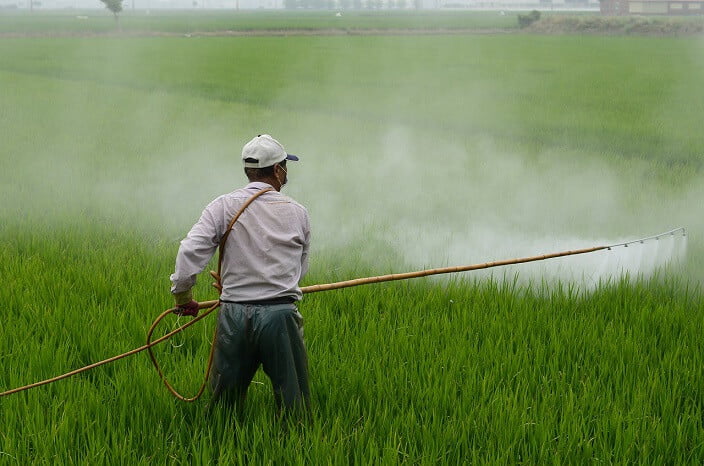
In Shocking Move, Bayer To Pull All Round-Up, Glyphosate Products From Store Shelves Forever
The company it isn't related to safety concerns but critics argue otherwise. Either way this voluntary move is a win for activists and environment!
(CN) – Monsanto’s parent company announced it will remove glyphosate-based products from retail store shelves by 2023 to prevent future litigation claims related to the chemical ingredient.
Bayer Ag said Tuesday that it would remove Round-Up from shelves and replace glyphosate with “new formulations that rely on alternative active ingredients.”
“This move is being made exclusively to manage litigation risk and not because of any safety concerns,” the company said in a news release. “As the vast majority of claims in the litigation come from Lawn & Garden market users, this action largely eliminates the primary source of future claims.”
Monsanto’s RoundUp, the most widely used weed-killer in the United States, contains glyphosate as its primary ingredient, which while effective at inhibiting plant enzymes, has been shown in scientific studies to be a possible carcinogen.
In 2019, a six-person jury awarded Edwin Hardeman $75 million in punitive damages and $5 million in compensatory damages for past and future pain and suffering, finding years of Roundup use likely caused his non-Hodgkin lymphoma.
The federal judge who oversaw the case later reduced the punitive damages award to $20 million, finding it excessive. Monsanto appealed, but the ruling was upheld by the Ninth Circuit.
Bayer said in the release that it was appealing the case to the Supreme Court and remained hopeful of a positive outcome.
“We want to provide comfort to our investors that the glyphosate litigation exposure should now be reasonably accounted for and leaves significant upside in the event of a favourable Supreme Court decision on the case,” said CEO Werner Baumann during an investor call.
The company has set aside $4.5 billion should the company not get a favourable ruling, which it will use likely to settle a bevy of claims related to Roundup users who have contracted non-Hodgkin lymphoma.
The company will replace glyphosate in Roundup regardless but continue to make the chemical available for professionals, including large-scale agriculture operation, it said. It said it would like to provide an alternative chemical recipe by 2023, but will require approval from the Environmental Protection Agency.
Several scientific studies, including a recent meta-analysis, have concluded there is at least a correlational relationship between exposure to high levels of glyphosate and the development of non-Hodgkin lymphoma.
The near-consensus among global regulatory agencies – including the U.S. Environmental Protection Agency, the European Commission and the Canadian Pest Management Regulatory Agency – concludes that there is no scientific evidence that glyphosate causes cancer or is genotoxic.
Genotoxicity describes a method whereby a toxin damages the genetic information of cells causing mutations that could lead to cancer.
Jennifer Sass, with the Natural Resources Defence Council, said in 2018 that Monsanto and other companies were undermining objective scientific inquiry into the correlation between the chemical and non-Hodgkin lymphoma.
“We must continue to resist the endless lobby campaign of Monsanto and the chemical industry and protect government scientists and chemical assessment programs, to let them do the important work of generating credible publicly available chemical hazard assessments on glyphosate, and all the other chemicals to which we are routinely exposed in our food, our drinking water, in household products, in building materials and through so many other everyday routes of exposure,” Sass wrote.
Monsanto has lost three high-profile lawsuits in the last year, with juries and judges ordering the company to pay $80 million, $78 million and $87 million, respectively, to plaintiffs who claim Roundup caused their cancers. The company – which is now owned by German chemical giant Bayer – has since moved to settle thousands of similar suits.
Experts estimate the company will dole out approximately $8 billion.
Nevertheless, Monsanto will not have to put labels on their products in California and can tout a federal judge’s acceptance of the current science that glyphosate is not a carcinogen.
“Glyphosate has been subject to rigorous scientific scrutiny by the federal government and regulators worldwide for decades,” Monsanto said, along with other agricultural groups that joined the company in the suit. “It is widely regarded as one of the safest herbicides ever developed, and the overwhelming scientific consensus is that it does not pose any risk of cancer.”
